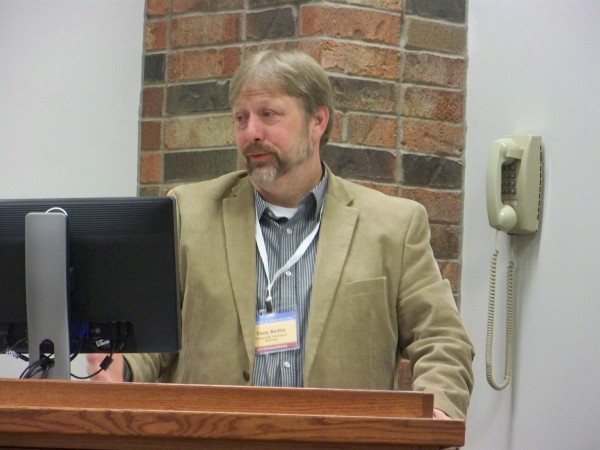Is it Full Partnership or Partial? The Church of God Struggles with the Role of Women
The Church of God 73rd International General Assembly met in Orlando, Florida July 27-30, 2010. This biennial meeting is a significant event on the Church of God (Cleveland, TN) calendar. Among other things, during this time denominational leadership is nominated and elected and contemporary issues facing the organization are discussed, debated, and decided, first by recommendations from the General Council of Bishops (all male), then by ratification of the General Assembly proper (all registered delegates, clergy and laity, male and female, over sixteen years of age). During this assembly the issue of women in ministry was prominent – and discussion was passionate.

Tony Richie at the 2014 Society for Pentecostal Studies convention held in Springfield, Missouri.
Acts 2:17-18 clearly indicates that Spirit-filled women have an important place alongside Spirit-filled men in the ministry of a Pentecostal church. Unlike many other Evangelical groups, the Church of God, one of the oldest of the classical Pentecostal denominations, ardently affirms the place of women in ministry; but the Church of God has often struggled to define the specifics of that place, particularly in leadership functions. This ambiguity contributes to partial affirmations combined with partial reservations. Soon after the General Overseer (aka Presiding Bishop), Dr. Raymond Culpepper, made moving remarks about uniting and implementing the Great Commission (Matt 28:18-20) and the Great Commandment (Matt 22:37-40) and led the gathering in a significant time of concert prayer, the General Council session quickly moved into passionate and spirited debate on the agenda item, Women in Ministry, particularly on ordination of women as bishops. In the Church of God, bishops comprise the General Council with rights to debate and vote in session. Also, only bishops are eligible to serve in almost all elected or appointed positions. Presently, the Church of God ordains women as ministers with full rights to preach, to perform weddings and the sacraments, and to pastor churches but it does not allow women to be bishops.
The Moderator repeatedly found it necessary to remind the Council to be sensitive of the Council’s tone, decorum, and demeanor and to carefully weigh all remarks. Opinions on this issue were polarizing. It seemed everyone passionately desired to correctly interpret, apply, and embrace the truth found in Scripture. Those “against” ordaining women as bishops adamantly argued that a literal interpretation of Scripture allowed no room for any other view. They appear to fear compromise of biblical beliefs thereby undermining commitment to biblical inspiration and authority. However, speeches made by those “for” ordaining women as bishops included several leading biblical scholars and theologians as well as church historians. These seem convinced that careful exegesis of Scripture and awareness of Church of God history and the Pentecostal heritage provide a firm foundation for full partnership in ministry. In fact, some argued that the struggle about the role of women in the Church of God is itself indicative of doctrinal transition or departure from the denomination’s Holiness Pentecostal roots toward a more Baptistic theology and polity. On the one hand, opponents to the motion were apparently concerned that a “liberalizing” trend beginning with ordaining women bishops might lead to similar steps in the future regarding ordaining homosexuals and lesbians. Proponents of the motion emphatically denied any such perceived connections. On the other hand, proponents of the motion to ordain women as bishops repeatedly compared antagonists to 19th century Christian slaveholders in the southern United States prior to the Civil War – a connection that was also emphatically denied by their opponents. Though much of this discussion was about nomenclature, culture and context, the process required a simple “yes” or “no” response. The motion failed with a “no vote” of 62.52%. A bold attempt to reconsider the subject in the General Assembly session failed as well.
Category: Ministry


